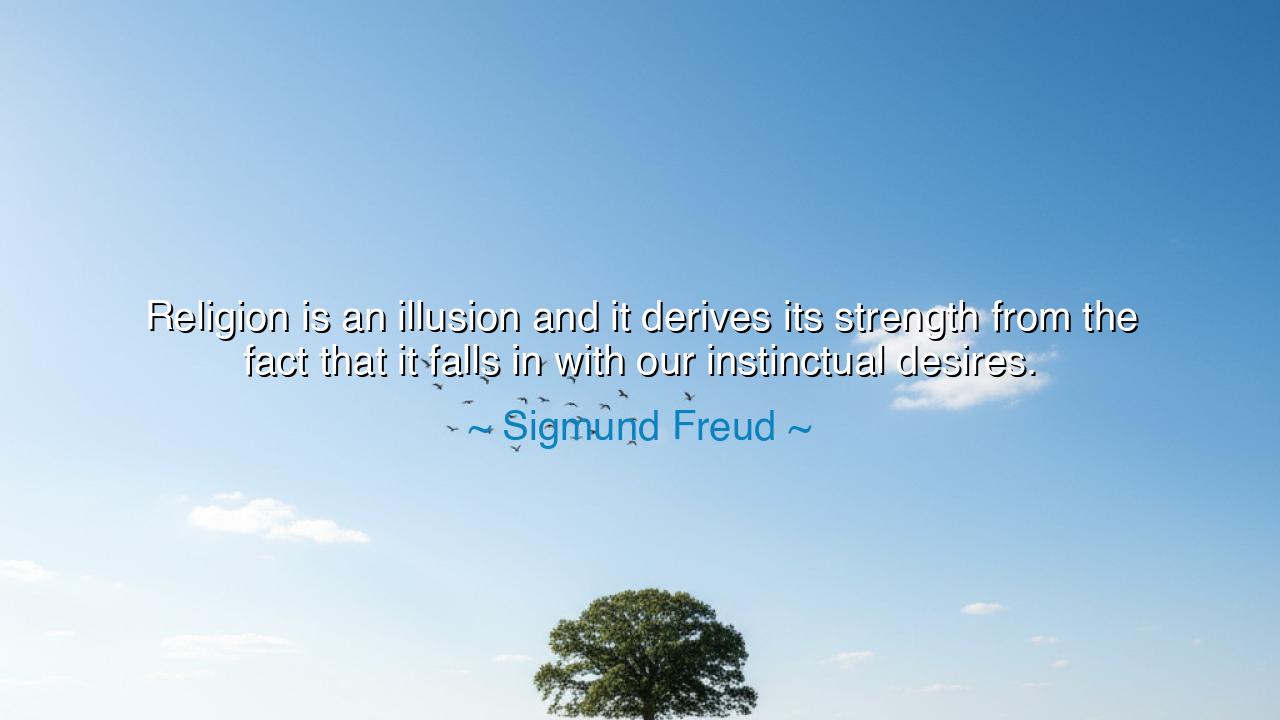
Religion is an illusion and it derives its strength from the fact
Religion is an illusion and it derives its strength from the fact that it falls in with our instinctual desires.






“Religion is an illusion and it derives its strength from the fact that it falls in with our instinctual desires.” – Sigmund Freud
In these daring and thunderous words, Sigmund Freud, the father of psychoanalysis, tears open the veil of belief to reveal the trembling heart of humanity beneath. He does not speak as a destroyer of faith, but as a seeker of truth—a physician of the soul who sought to understand why man believes. When he calls religion an illusion, he does not mean it is mere deceit or folly; rather, he means it is a creation of the human mind, born from the same deep instinctual desires that drive us to love, to hope, to fear, and to dream. Religion, to Freud, is the mirror of our longing—the cosmic echo of our yearning to be safe in a universe vast and uncertain.
The origin of this thought lies in Freud’s great work The Future of an Illusion, written in the twilight of his life, when he gazed upon a Europe scarred by war and anxiety. He saw how mankind, frightened by its own fragility, reached out to the heavens for comfort. In that reaching, he saw not revelation, but reflection: the projection of the human parent into the divine Father, the wish for protection made eternal. To him, religion drew its strength not from truth discovered, but from desires fulfilled—the desire for justice beyond death, for order amidst chaos, for meaning in the face of suffering. “Man,” he said, “creates God in his own image.”
And yet, there is both tenderness and tragedy in this view. Freud does not mock belief; he laments the weakness that makes it necessary. He sees in religion the poetry of fear—the attempt of the childlike heart to make sense of a perilous world. The thunder becomes the voice of God; death becomes the doorway to immortality. To call religion an illusion is not to call it evil—it is to recognize its beauty and its peril. For illusions, like dreams, can heal the soul—but they can also chain it, if mistaken for reality.
Consider the tale of the ancient Greek philosopher Epicurus, who, centuries before Freud, told his followers that the gods, if they exist, are unconcerned with human affairs. “Do not fear death,” he said, “for where death is, we are not.” His words were a cry for freedom from the terror that had enslaved men under superstition. Yet even as his reasoning spread, humanity continued to build temples and altars—not out of ignorance alone, but out of instinctual desire. For man is not satisfied with reason alone; he hungers for meaning. And so, even in the age of science, he returns to faith, like a child returning to the arms of a mother he no longer believes in, yet still loves.
Freud saw this pattern and understood its power. The illusion of religion endures because it fulfills the deepest needs of the psyche: the need for love, for moral certainty, for belonging to something greater than the self. It gives form to formlessness, hope to despair, and order to the unknowable. Even when men abandon temples, they often build new ones—ideologies, nations, philosophies—all clothed in the same sacred fervor. The instinct does not die; it merely changes shape. Thus, the strength of religion lies not in its creeds, but in its reflection of the eternal human heart.
And yet, Freud’s lesson is not one of scorn but of awakening. He would have us recognize the illusion, not to destroy it, but to rise above it—to understand the forces within us that create gods, and thus to reclaim the freedom of self-awareness. For the one who understands his own desires is no longer their prisoner. To see why we believe is the first step toward believing wisely, or perhaps toward finding meaning in the silence of an indifferent universe.
So, my child of thought and faith, learn this: to question is not to blaspheme, but to grow. Religion, as Freud saw it, is the poetry of our need for love and purpose. Cherish the beauty it holds, but do not mistake its form for ultimate truth. Seek not the Father in the clouds, but the strength within your own soul. For when you look honestly into your desires, your fears, and your longing for the divine, you may find that the sacred has never been outside of you—it has always dwelled within. In knowing this, you transcend illusion not by destroying it, but by transforming it into wisdom.






AAdministratorAdministrator
Welcome, honored guests. Please leave a comment, we will respond soon